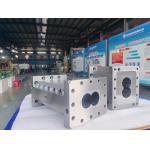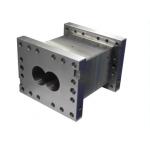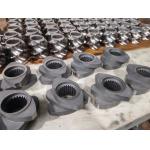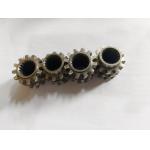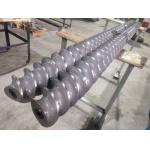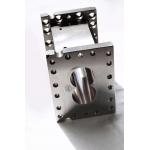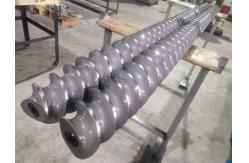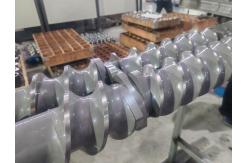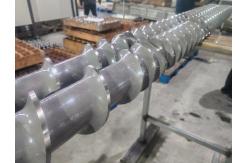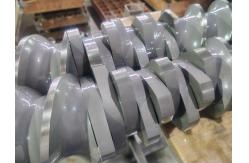Structural composition
Transmission device: Provides power to the screw, enabling it to
rotate and facilitating the transportation and processing of
materials. It usually includes components such as a motor, a
reducer, and a coupling.
Feeding device: Used to uniformly add materials into the extruder.
Common examples include feeding hoppers and metering devices, which
can precisely control the amount of material added.
Cylinder: The component that holds the materials and the screw. It
typically has an "∞" shape cross-section, providing space for the
plasticization, mixing, and transportation of materials. It also
features heating and cooling systems to control the processing
temperature of the materials.
Screw: The core component of a twin-screw extruder. Two parallel
screws rotate within the cylinder, using the screw's threaded
structure and mutual meshing to achieve functions such as material
transportation, compression, shearing, mixing, and plasticization.
The screw is usually designed in a modular style and can be
replaced with different threaded elements according to different
processing requirements. Working principle
Concurrent-mating twin-screw extruder
Seamless-mating extruder: The low-speed extruder has a
seamless-mating screw geometry, where the helix shape of one screw
closely fits with that of the other screw, forming a conjugate
screw geometry. It is mainly used for profile extrusion.
Self-cleaning extruder: The high-speed concurrent extruder has a
seamlessly matched helix shape, which can be designed with a
relatively small screw clearance to achieve a sealed self-cleaning
effect. It is called a seamless self-cleaning concurrent-rotating
twin-screw extruder and is used for processing special polymers.
Concurrent-mating reverse-rotation twin-screw extruder: The gap
between the screw slots of the two screws in the concurrent-mating
reverse-rotation twin-screw extruder is very small, allowing for
positive conveying characteristics. It is often used in profile
extrusion and other fields.
Non-mating twin-screw extruder: The center distance between the two
screws is greater than the sum of their radii. Its conveying
mechanism is quite different from that of the mating extruder,
being more similar to that of a single-screw extruder, and is
mainly used for mixing, exhaust, and chemical reactions, such as in
the production of various engineering plastics, masterbatches, and
composite materials.
Equipment classification
By screw rotation direction classification
Concurrent-rotating twin-screw extruder: The rotation directions of
the two screws are the same, with good mixing, dispersion, and
self-cleaning performance. It is commonly used in polymer blending,
modification, granulation, and other fields, such as the production
of various engineering plastics, masterbatches, and composite
materials.
Reverse-rotating twin-screw extruder: The rotation directions of
the two screws are opposite, with strong extrusion pressure and
conveying capacity, suitable for some occasions that require
high-pressure extrusion, such as profile extrusion and pipe
extrusion.
By screw mating degree classification
Seamless-mating twin-screw extruder: The mating gap between the
screws is very small, and the flow of the material in the screw
mating area is strictly restricted, resulting in good mixing and
plasticizing effects. However, it consumes a lot of power and is
suitable for occasions with high requirements for the uniformity of
mixing and plasticizing quality.
Non-seamless-mating twin-screw extruder: The mating gap between the
screws is large, and the flow of the material in the screw mating
area is relatively free. It has strong conveying capacity and
relatively lower power consumption, suitable for some occasions
with higher production requirements and relatively lower
requirements for the uniformity of mixing. Advantages
Excellent feeding performance: For some materials with poor
friction properties, single-screw extruders may have difficulties
in feeding. However, double-screw extruders, especially those with
meshing type, have the material transmission in a certain degree as
forward displacement transmission, which can effectively solve the
feeding problem.
Excellent mixing and plasticizing performance: The complex flow
spectrum of materials in double-screw extruders makes them have
advantages such as thorough mixing, good heat transfer, and large
melting capacity. This enables the materials to be fully mixed and
plasticized, improving product quality.
Good exhaust performance: It can effectively remove volatile
components and gases from the materials during the extrusion
process, improving the performance and quality of the products. It
is suitable for producing products with lower requirements for gas
content, such as high-performance engineering plastics, cable
materials, etc.
High extrusion stability: It can precisely control the material
delivery volume and extrusion pressure, ensuring the stability of
the extrusion process, thereby improving the dimensional accuracy
and stability of the products.
Good maintainability: It is easy to open, and the wear degree of
components such as screw elements and inner liner of the barrel can
be detected at any time, making it convenient for effective
maintenance or replacement, shortening the maintenance time and
reducing labor intensity.
Wide application range: It can be used for the processing of
various materials, including plastics, rubber, food, medicine,
chemicals, etc., and can meet the production needs of different
industries. Application fields
Plastic processing: It is used for producing various plastic
products, such as pipes, plates, films, special profiles, injection
molded products, and raw material granulation, etc. It can also
modify plastics by adding fillers, reinforcing fibers, toughening
agents, flame retardants, etc. to improve the performance of
plastics.
Food processing: It can be used to produce foods such as noodles,
biscuits, candies, breakfast cereals, snack foods, nutritional rice
flour, artificial meat, etc., and can realize the processing steps
of material mixing, maturation, and shaping.
Chemical field: It is used to produce chemical products such as
paints, adhesives, pigments, inks, rubber products, etc. It can
perform operations such as mixing, dispersion, and reaction on raw
materials.
Pharmaceutical field: It can be used to produce pharmaceutical
products such as tablets, capsules, granules, etc., and can realize
processing steps such as mixing of drug raw materials, granulation,
and coating to improve the quality and stability of drugs.
Selection points
Production capacity: Choose the appropriate specification of
twin-screw extruders based on the required output. Generally, it is
measured by the extrusion output per hour (kg/h).
Screw diameter and aspect ratio: The larger the screw diameter, the
stronger the production capacity; the larger the aspect ratio, the
longer the residence time of the material in the screw, and the
better the mixing and plasticizing effect, but the power
consumption will also increase. The appropriate screw diameter and
aspect ratio should be selected according to the material
characteristics and processing requirements.
Rotation speed and torque: High rotation speed can improve
production efficiency. However, for some heat-sensitive materials
or processing processes requiring high torque, a suitable rotation
speed and torque should be selected for the extruder.
Drive power: Select the appropriate drive power based on the
specifications of the extruder and production requirements to
ensure the normal operation of the equipment.
Automation level: Consider whether the control system of the
extruder is advanced, whether it has functions such as parameter
recording, formula management, and remote control, to improve
production efficiency and the stability of product quality.
